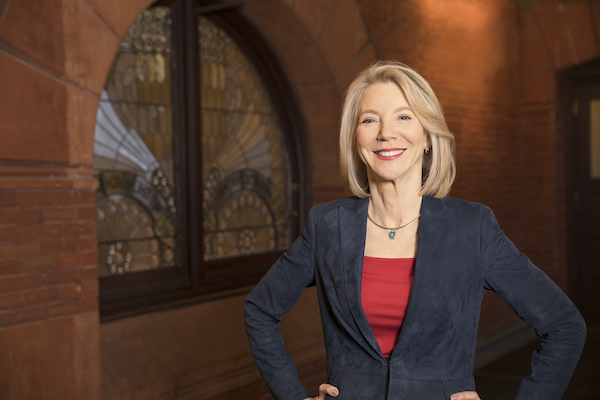The 2021 Pennsylvania Power 100

Pennsylvania State Capitol Sean Pavone/Shutterstock
It’s safe to say it’s been an eventful year in Pennsylvania, particularly in politics. As Gov. Tom Wolf and the General Assembly grappled over COVID-19 restrictions and budget fixes, the state, counties, and cities all dealt with numerous other developments. Officials and organizations alike have looked to address issues in health care, policing, elections – you name it. Our staff at City & State has researched and reported on all the movers and shakers, and now, we’ve determined who truly holds the most power in the Commonwealth.
For the first time since it’s relaunch, City & State Pennsylvania is releasing its Pennsylvania Power 100, which recognizes the most influential people in the public and private sectors statewide. This must-read list – co-written by reporters Justin Sweitzer and Harrison Cann – highlights a diverse array of leaders in the Commonwealth, including elected officials, lobbyists, media personalities, philanthropists, labor leaders, academics, business leaders, and more.
All of these individuals have contributed to Pennsylvania policy in one way or another. Whether they’re shaping legislation, running programs, or representing workers, each of these people have helped all corners of the state get to where they are today.
1. Tom Wolf
Governor

The trajectory of Gov. Tom Wolf’s second term changed dramatically with the onset of the COVID-19 pandemic, causing him to shift his focus away from a raft of progressive policy priorities and to address the spread of the coronavirus. In doing so, Wolf became the undisputed face of Pennsylvania, leading the state’s pandemic response alongside then-Health Secretary Dr. Rachel Levine. Over the course of the past year, Wolf has leaned heavily on his broad emergency powers to implement and rollback COVID-19 mitigation efforts, relax regulations and help refine vaccine distribution. He has signed legislation that would bolster the state’s vaccine deployment with the help of the National Guard and floated an ambitious budget proposal that would overhaul how education is funded in Pennsylvania. Wolf also serves as a crucial backstop for Democrats, as he is often the last line of defense against conservative bills that conflict with his party’s agenda. The Democratic governor has also moved Pennsylvania closer to entering a multi-state compact to cap carbon emissions and committed to finding alternative funding mechanisms to replace the state’s gas tax. Wolf’s tenure in Harrisburg has been fraught with battles between the Republican-led state legislature and his administration, which has only been exacerbated by the COVID-19 pandemic. Regardless of where you stand on Wolf’s policies and decisions, if the last year has made anything clear in Harrisburg, it’s that no statewide political figure has the power and influence to rival Tom Wolf.
2. Bob Casey Jr.
U.S. Senator

A veteran of the U.S. Senate, Bob Casey is a respected voice among Democrats and Republicans alike, particularly for his efforts to improve education and health outcomes for children. He’s been a strong supporter of the nation’s nutrition assistance programs and introduced legislation this session to expand eligibility for the Child and Adult Care Food Program, which would allow child care centers to offer more meals to children in their care. Casey is also reaching across the aisle to partner with U.S. Sen. Susan Collins to close a gap that allows children to be kicked out of the WIC nutrition assistance program before they start school. In addition to Casey’s investment in childrens’ issues, he has also molded himself into a leading advocate for elderly and disabled individuals. Casey is chair of the Senate Special Committee on Aging, and in 2018 succeeded in getting a law passed that improves access to information and bolsters resources for grandparents that raise their grandchildren. Pennsylvania’s senior U.S. senator has also sponsored a bipartisan, bicameral slate of police reforms this year designed to alter state and regional 2-1-1 and 9-8-8 call systems and divert some non-emergency calls to mental health and human services professionals. Casey has been elected to the Senate for three straight terms, emerging with double-digit victories in two of three elections. Now, with a Scranton-born Democrat in the White House, Casey has a new ally to help him see his legislative goals to the finish line.
3. Brian Roberts
Chair and CEO, Comcast Corp.

A billionaire businessman at the helm of one of the nation’s leading telecommunications companies, Brian Roberts’ influence can be felt across the Keystone State – not to mention the nation. There’s a pretty good chance that whenever you turn on the TV or connect to your Wi-Fi, that Comcast is behind it. Under Roberts’ watch, the Philadelphia-based telecommunications conglomerate increased its annual revenue from $657 million in 1990 to roughly $108 billion today, while transforming Comcast into a leading internet and cable TV provider. Comcast saw both its revenues and profits increase in its most recent fiscal year, earning a spot in the top 30 of the 2020 Fortune 500 rankings. Comcast also devotes a considerable amount of cash to influence policymakers each year, ranking among the top 20 companies in terms of lobbying expenditures since 1998. Under Roberts’ leadership, Comcast also made significant efforts to increase access to broadband throughout the COVID-19 pandemic. The company expanded its Internet Essentials program, rolling out more than 1,000 “Lift Zones” – dedicated areas within community centers designed to connect low-income students across the country with broadband internet.
4. Pat Toomey
U.S. Senator

U.S. Sen. Pat Toomey may be leaving office next year, but that doesn’t take away from the impact he has on Capitol Hill. He’s currently the ranking member on the Committee on Banking, Housing, and Urban Affairs, and is one of the upper chamber’s most ardent fiscal watchdogs, routinely voicing concerns with spending proposals coming from President Joe Biden’s administration. Toomey has also remained an advocate for strengthening background checks on gun purchases, despite both state and federal inaction on the issue. He has also introduced legislation this session to strengthen penalties against those who murder police officers, as well as legislation to that would prevent the release of COVID-19 vaccine intellectual property. He also is working with colleagues on a streamlined infrastructure package that serves as a Republican alternative to Biden’s American Jobs Plan, another initiative that only underscores Toomey’s legacy as a staunch fiscal conservative in the U.S. Senate. Toomey has indicated that he will not be running for elected office once his term expires and that he will instead transition to the private sector. His seat is already aggressively being sought by Democrats and Republicans alike. Regardless of what his future holds, it’s likely that Toomey will still wield considerable influence wherever his plans take him.
5. Jake Corman
Senate President Pro Tempore

As the top-ranking Republican in the state Senate, Jake Corman not only sets the tone for how his caucus – and the chamber – operates, but also has immense power over what bills do and don’t get passed in Harrisburg. He is also charged with the appointment of members to the chamber’s 22 committees. After being elected as president pro tempore in 2020, Corman took immediate steps to differentiate himself from his predecessor, Joe Scarnati, by coming out in support of a legislative proposal that would provide sexual assault survivors with a two-year look-back window to sue their abusers. Corman, along with state House Speaker Bryan Cutler, is also spearheading an overhaul of the state’s lobbying disclosure law that would require campaign consultants to register with the Department of State, while also banning campaign consultants from simultaneously being registered lobbyists. Corman, by nature of being one of the General Assembly’s highest-ranking Republican lawmakers, also serves as a foil to Gov. Tom Wolf and his agenda, as he stands in the way of many of Wolf’s budget and policy proposals. To Democrats, this is undoubtedly a negative, but when you look at Corman’s record of stifling Wolf’s agenda, as well as his own legislative achievements throughout his 20-plus year career in Harrisburg, it’s hard to argue any state legislator has more sway on what goes on in the state Capitol than Jake Corman.
6. Josh Shapiro
Attorney General

Since first being elected in 2016, Josh Shapiro has steadily built up his resume as attorney general as he eyes the next step in his political career. From 2016 to 2020, Shapiro positioned himself as a leading opponent to former President Donald Trump’s administration, challenging the former president’s immigration policies, regulatory changes and his legal challenges to the 2020 election results. Shapiro has also joined multi-state lawsuits against Facebook and Google, called for an overhaul to how the state regulates fracking and helped push through legislative changes to how police hire and screen prospective officers. While these all could serve as feathers in the cap of the state’s attorney general, Shapiro’s crowning achievement is his leadership of the 40th Statewide Investigating Grand Jury, which uncovered widespread child sex abuse within six Pennsylvania Catholic dioceses. The grand jury’s findings served as a catalyst for a historic raft of statute of limitations reforms signed into law by Gov. Tom Wolf in 2019. As a result of the investigation, Pennsylvania’s criminal statute of limitations for child sex abuse was abolished, and a number of other statute of limitations windows were extended. Shapiro continues to advocate for both legislative and constitutional changes that would allow sex abuse survivors to sue their abusers if the statute of limimitations has already expired. Widely viewed as a rising star within the Democratic Party, Shapiro handily won reelection in 2020 and has also been rumored to have an interest in running for governor in 2022 – meaning you’ll likely be hearing more from him in the near future.
7. Neal Bisno
Executive Vice President, SEIU

Neal Bisno is a labor heavyweight in the Keystone State, currently serving as the executive vice president of SEIU – a labor union comprised of more than 2 million workers in health care, property services and the public sector. As executive vice president, Bisno has championed COVID-19 protections for SEIU’s members, as well as President Joe Biden’s proposed “American Jobs Plan,” which Bisno has said will allocate $400 billion to improve access to home and community-based health care services if approved by both houses of Congress. Bisno has also been a part of the union’s nationwide campaigns to raise the minimum wage, combat racial inequality and pass the “PRO Act,” which would allow unions to override state “right-to-work” laws and prohibit employers from interfering in union elections. Prior to joining SEIU’s national arm, Bisno was the president of SEIU Healthcare Pennsylvania, where he represented close to 25,000 workers in the health care sector. During his time at SEIU Healthcare Pennsylvania, Bisno supported state-level legislation that provided mandatory overtime for health care staff. Under Bisno’s watch, the state SEIU Healthcare chapter also pushed for the passage of the Affordable Care Act, along with Pennsylvania’s Medicaid expansion. His familiarity with Pennsylvania labor issues, coupled with his experience and influence with SEIU, makes him one of the most formidable labor leaders in the Commonwealth.
8. Jeffrey Romoff
President and CEO, University of Pittsburgh Medical Center

Not only is UPMC one of the largest health care networks in Pennsylvania, but it’s also Pennsylvania’s largest employer outside of government, with more than 92,000 employees across the Commonwealth. Under Romoff’s leadership, UPMC increased its operating revenue in 2020 by $3 billion, while also increasing its operating income by nearly $600 million. UPMC’s statewide footprint is continuously growing, with 40 hospitals, 8,700 licensed beds, 700 outpatient offices and approximately 6,300 physicians. The health network also fields an annual 5.5 million outpatient visits, 355,000 inpatient admissions and 900,000 emergency visits. Like many other health care providers across the nation, Romoff and his $23 billion health care nonprofit had to shift their efforts to battling the COVID-19 pandemic in 2020. In addition to caring for those who contracted the virus, UPMC has also been a key vaccine distributor, helping to disburse available doses to people across the state. UPMC’s work to protect patients from COVID-19 wasn’t just limited to vaccines. Currently, Romoff has his team working to provide new monoclonal antibody treatment for COVID-19, which uses antibodies to block the virus’ ability to enter cells, thus slowing down the infection. Those in the health care sector had to step up to respond to the pandemic, and UPMC’s administration of more than half a million COVID-19 vaccines is a testament to the impact Romoff and his team have had during the current health crisis.
9. Amy Gutmann
President, University of Pennsylvania

As University of Pennsylvania’s longest-tenured president, Amy Gutmann is internationally renowned for her leadership at Penn. She was previously named one of Fortune magazine’s “World’s 50 Greatest Leaders” and has implemented a three-pronged approach to overseeing Pennsylvania’s only Ivy League university. Gutmann’s “Penn Compact” – first outlined in 2004 – centers around inclusion, innovation and impact, as part of a broad effort to make the university more accessible and bolster its ability to make positive change across the world. During her tenure, she has raised more than $9 billion for the university and spearheaded the largest fundraiser in university history – the $4.3 billion “Making History” campaign in 2012. The university also recently received an anonymous $5 million bitcoin donation that will be directed toward the school’s Stevens Center for Innovation in Finance, which focuses on finance and technology. Under Gutmann’s leadership, the university has also made significant investments in the community, including giving a total of $25 million to the Penn Alexander School over the last 15 years. Last year, Penn pledged $100 million to the School District of Philadelphia over a 10-year period for school building repairs. Thanks to Gutmann’s bold, steady hand, Penn is continuously growing as an academic and philanthropic powerhouse.
10. Gene Barr
President and CEO, Pennsylvania Chamber of Business and Industry

There may be no greater ally to the business community in Harrisburg than Gene Barr, the current president and CEO of the Pennsylvania Chamber of Business and Industry. The PA Chamber represents nearly 10,000 members and wields a massive amount of influence within the state Capitol – so much that Gov. Tom Wolf tapped Barr to offer reassuring remarks and strategies to the business community as Wolf rolled out his first COVID-19 restrictions on businesses. As the head of the chamber, Barr has established himself as a vocal advocate for business-friendly policies, including corporate tax reforms, workforce development initiatives and other proposals that provide flexibility to businesses across the state. Later in the COVID-19 pandemic, Barr emerged as a vocal critic of the governor’s restrictions on businesses and fought for the relaxation of Wolf’s mitigation orders. Barr and the PA Chamber are also active on the political side of things, offering endorsements and contributions to a slate of candidates each election cycle. (The ChamberPAC spent more than $137,000 on campaign-related expenses in 2020.) The opinion – and the endorsement – of the PA Chamber goes a long way, warranting Barr’s placement in the top 10 of our Pennsylvania Power 100 list.
Continue to the 2021 Pennsylvania Power 100: 11-50 >>
NEXT STORY: 2021 Pennsylvania Power 100 Event
